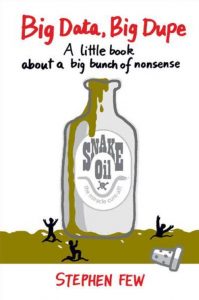
Stephen Few: Big Data, Big Dupe – Analytics Press 2018
„Big Data is nothing but a marketing campaign that was designed to put money in the pockets of technology vendors and their collaborators.“
(Stephen Few: Big Data, Big Dupe – Analytics Press 2018, page 31)
Stephen Few is well known for his work on visually communicating data more effectively and more efficiently. He now published a non-technical book about his view on Big Data. „A little book about a big bunch of nonsense“ as he describes it.
He researched many books and articles to discuss other authors efforts to define Big Data or to argue against Big Data claims. Stephen Few also shows dangers of Big Data like hoarding volumes of data with the aim to conceal bad models. With all the hype around Big Data, people get distracted from what is actually needed.
He delivers a concise essay on 84 pages only. Few is very clear and precise in his words throughout the book. There are no charts or graphs. The book assembles newsletter and blog articles that Stephen Few wrote in recent years. “Big Data, Big Dupe” is entirely different compared to his other books.
Big Data Myths
There is no doubt that businesses must make better use of information and gain new insights. Decision support, Data Warehousing or Business Intelligence already promised to obtain big value from data. Big Data now comes with the same and even better promises to make Date Warehousing obsolete. Can vague terms like Volume, Velocity, and Variety help to make Big Data tangible?
Stephen Few covers several dangerous claims, e.g.
- Collect and analyze all data
- We don‘t need to be concerned about data quality
- Subject matter expertise is no longer needed
Domain knowledge is essential to derive value from data. Data integration or analytical skills are necessary but cannot replace subject matter expertise. Such skills complement each other. Data volume does not make those skills obsolete. Data increased year in and year out and is nothing new. VLDB (Very Large Databases) is an international conference that was held for the first time already in 1975. Data sets were large in the past, too. Not all data is relevant, and that data needs to be of quality.
Data sense-making
Stephen Few complains that businesses get distracted about what is needed: making sense of data. Fundamental skills can only lead to data-sensemaking. These skills are not for free and require a significant investment in the knowledge of methods, concepts, or architectures. Big Data comes with a bunch of tools that are claimed to be easy to use. A fool with a tool is still a fool. Sense-making of data is and remains hard work. The path to success is not free of pain. Organizations need to promote their employees’ skills.
I’m giving a lecture on Data Warehousing and a seminar on Big Data at Baden-Wuerttemberg Cooperative State University DHBW. I challenged the students in the latest exam if they agree or disagree with Stephen Few to regard Big Data as a marketing campaign. I didn’t care if students agreed or disagreed with Stephen Few’s view in the exam – I graded valid arguments to substantiate their opinion. Do young people value the „old“ concepts and methods I taught in the Data Warehousing course or do they rate the claimed Big Data sexiness higher? Most of the students agreed with Stephen Few. I was pleased with their arguments for both sides. The technological silver bullets won’t solve the business problems. The path to a solution to derive value from data includes skills and other fundamentals like data quality, practice, etc.
An interview with Stephen Few on “Big Data, Big Dupe” can be found on Stacey Barr’s blog.
